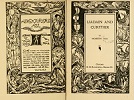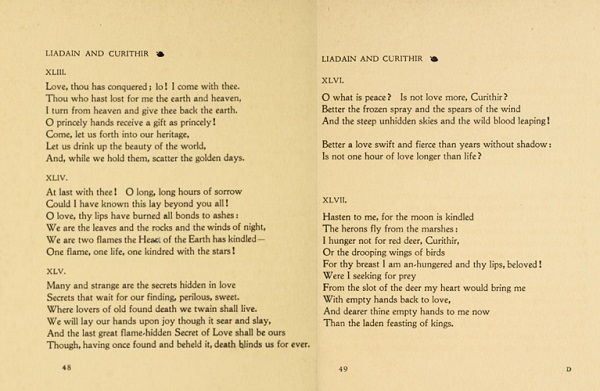|
Moireen A. Fox
Life
1883-1972 [Moireen Fox; Mrs. Claud Chevasse; Moireen Fox; occas. pseud. “Móirín Chevasa” or “Cheavasa”; err. as Máirín [sic] A. Cheavasa] b. Pinner, London, of Anglo-Irish parents; moved to Ireland, 1907; ed. Ballingeary College; m. Claude Chevasse, 1917; settled in Galway where they kept an Irish-speaking household; Chevasse converted to Catholicism, in 1935; she wrote poetry, fiction, drama and biography incl. a biography of Terence MacSwiney (1961); she issued a verse adaption of "Comracc Liadaine i Cuirithir", an Irish tale of the 9th or early 10th century and the rest of her works, excluding the life of MacSwiney, Mayor of Cork (d.1920) come from Irish legendary sources also.
[ top ]
Works
- Flower o’ the May (Belfast: M’Caw, Stevenson & Orr
1910).
- Liadain and Curithir [Adventurers All Ser., No. 15] (Oxford:
Basil Blackwell 1917), 58pp.
- Midhir and Etain, a poem (Dublin/London: Talbot
Press Booklets 1920).
- The Fire-Bringers: A Play in One Act (Dublin:
Talbot Press; London t. Fisher Unwin 1920), [4], 43 [1]pp., 16cm. [as Moirin A Cheavasa].
- Dedicated to Maud Gonne MacBride.
- The One Unfaithfulness of Naoise: A Poem (Dublin:
Talbot 1930).
- The Fall of the Year: Collected Poems (Dublin: Gayfield
Press [1940]), vi, 120pp. [as Moirin Chevasa].
- Terence MacSwiney (Dublin: Clonmore & Reynolds
1961), 232pp. [as Moirin Chevasse; incls. list of MacSwiney’s published writings].
|
Bibliographical details
| Liadain and Curithir [Adventurers All Ser., No. 15] (Oxford: Basil Blackwell 1916), 58pp. |
 |
 |
 |
 |
 |
| [ Click each of the above images to enlarge it in a separate window. ] |
|
Note: Liadain and Curithir (1916) contains a dedicatory poem to Ella Young and a notice of acknowledgement to the American journal: ‘My thanks are due to Poetry (Chicago) for permission to re-publish several of these poems.’ [p.5] See Internet Archive - online; accessed in page-view [13.08.2023]. The poetry versions use the archaic pronouns "thou art" and "thee". |
| Foreword |
| Liadan and Cuirithir, though not among the most ancient of the Irish tales, since it dates from Christian times, has reached us in a fragmentary condition. It was writtetn down at latest in the 9th or early 10th century, and is partly in prose, partly in verse. I have only taken the frame stroy, even as it exists, and where the Liadain I conceived conflicted with that of the original I have let her take her own way, believing it to be the only means of enduing her with life. We know how in every epic cycle, whether in that of Homer or Oisin, the characters have been changed and their proportions altered by the different copyists; the Irish epics have especially suffered at their hands, for the scribes, being themselves monks, believed it their duty to force the old legends into the boundaries of the new faith hence the euhemerism of the ancient Celtic gods, the substition of Spain for the Land of the Ever Living and many other acts of pious vandalism. Equally they would desire to end this tale with Liadain reconciled to the faith whose laws she had broken. For myself I am unable to belive that the Liadain of passionate impulse and unrestrained deeds they have portrayed would so have ended her days, and this must be my apology for my unfaithfulness to the original. |
| |
 |
| Transcription (XLVII): |
Hasten to me, for the moon is kindled
The herons fly from the marshes;
I hunger not for red deer, Cuirithir,
Or the drooping wings of birds
For thy breast I am an-hungered and they lips, beloved!
Were I seeking for prey
From the slot of the deer my heart would bring me
With empty hands back to leave,
And dearer thine empty hands to me now
Than the laden feasting of kings.
|
|
| p.49; see page-copy at Internet Archive - online; accessed 12.08.2023.) |
| [ Note: The margins of the original pages have been been cropped to fit better in the RICORSO frame. ] |
|
|
[ top ]
Notes
Adventurers All: The Blackwell’s series of this name bears the following epigraph on the facing-title page of each number in a unique calligraphic font: Adventures All / A Series of Young Poets / Unknown to Fame. “Come my friends - ‘tis not too late to seek a newer world. It may be that the fulgs will wash us down. it may be we shall touch the happy isles. Yet our purpose holds - to said beyond the sunset.” Ulysses.
|





